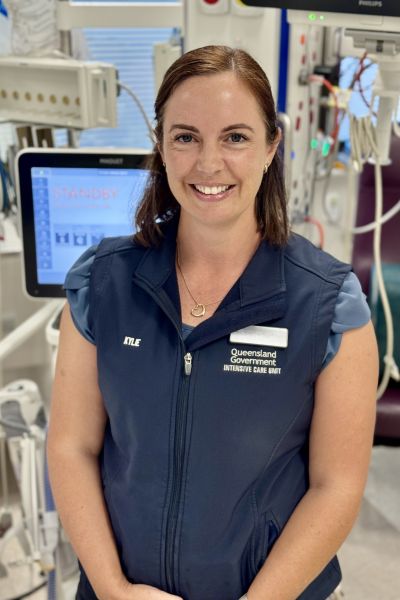Improving the patient experience in Redcliffe Hospital’s Intensive Care Unit

Redcliffe Hospital Research Nurse Coordinator Kylie Jacob is examining the impact of nutrition and sleep interventions for ICU patients.
Patients admitted to an intensive care unit (ICU) are critically unwell and require continuous observation and monitoring by staff. Research at Redcliffe Hospital is examining the impact of nutrition and sleep interventions on the patient experience.

Redcliffe Hospital Research Nurse Coordinator Kylie Jacob is examining the impact of nutrition and sleep interventions for ICU patients.
Senior Dietitian Alicia Wiese and Research Nurse Coordinator Kylie Jacob are exploring ways to improve the ICU experience at Redcliffe Hospital through nutrition and sleep interventions.
“ICU patients are a highly vulnerable group,” Alicia said.
“There are significant impacts including weight loss and muscle wasting, which can be further exacerbated when patients consistently fall short of their nutritional needs.”
Alicia and her team followed the nutritional intake of 56 patients on oral diets across four months to see how much protein and energy the patients were consuming from food in the ICU and beyond onto the acute ward.
“In this group, we found only 20 per cent were meeting their daily energy intake and 12 per cent the recommended amount of protein due to barriers such as low appetite, fatigue and delirium,” Alicia said.
A multifaceted nutrition pathway was then developed and implemented, including nutrition screening, high protein-low volume nutrition supplement drinks, energy-dense foods and dietary education.
Post-implementation, the team followed another 56 patients to determine the impact of the nutrition pathway.
“The post-implementation group showed significantly improved nutritional intake with 60 per cent reaching their energy intake for the day and 47 per cent meeting their recommended amount of protein,” Alicia said.
Armed with the information from this research, Alicia is now undertaking her PhD working with a larger patient cohort with a view to improve the functional recovery of patients through nutrition.
Her research involves the co-design of a nutritional intervention aimed at overcoming patient-perceived barriers to oral intake, with the goal of increasing protein consumption on the post-ICU ward.
For Kylie and the team researching sleep hygiene in the ICU, the starting point was recognising that the environment is not one conducive to quality sleep.
“By necessity, ICUs can be noisy places,” Kylie said.
“Patient instability and the requirement for constant observation and elevated noise and light levels mean that sleep is easily interrupted.”
Sleep disturbance has a strong association with delirium and can lead to a prolonged length of stay in the ICU, along with other adverse effects.
“Our research recognised that sleep quality is influenced by a variety of factors, including those during daylight hours that affect circadian rhythms,” she said.
“Interventions included maximising natural light during the day, attempting to limit daytime sleeping and dimming bay lights.
“Overnight, noise and light are minimised, and patients are offered eye masks and earplugs, to help improve sleep quality, as well as identifying individual patient sleep preferences such as music, positioning or environment.”
For both Alicia and Kylie, the work is not over, with both continuing to research how improvements to nutrition and sleep can benefit ICU patients.
The ICU team is looking at ways to evaluate the changes made and conducting patient interviews to see what impact the changes have had.
